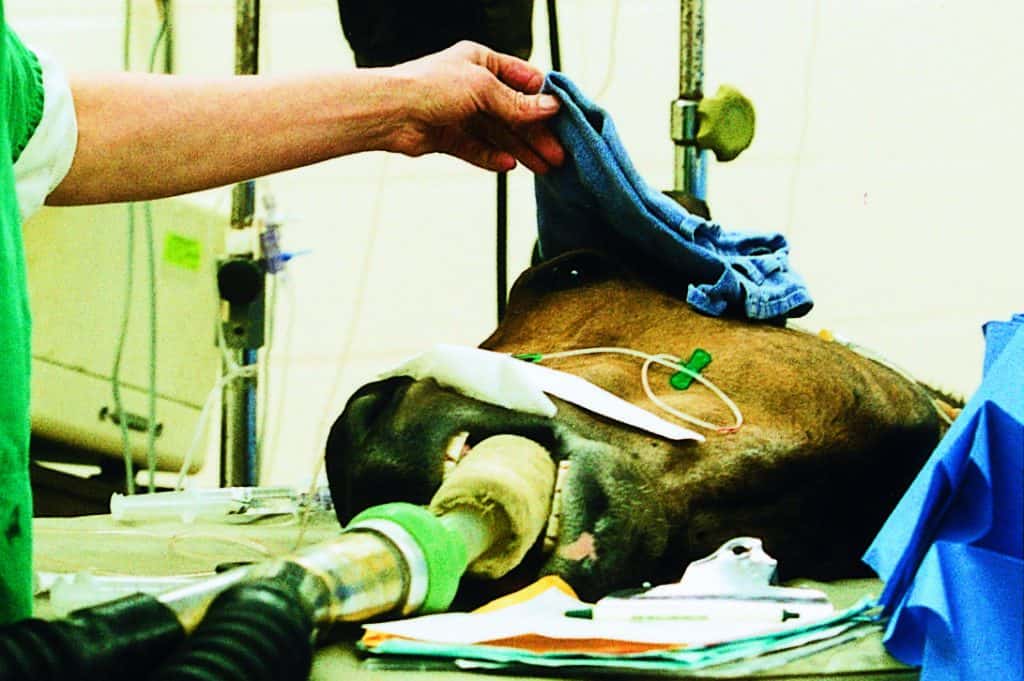R. Equi Pneumonia Best Targeted with Antimicrobial Combo (AAEP 2010)
Current evidence suggests that the most successful treatments are a combination of the drug rifampin and a macrolide (an antimicrobial drug).
Current evidence suggests that the most successful treatments are a combination of the drug rifampin and a macrolide (an antimicrobial drug).

Discussion of the session on sedatives and anesthetics for horses at the 2010 American Association of Equine Practitioners convention with Dr. John Hubbell of The Ohio State University.

Discussion of compounded medications for horses, including legal/illegal use and potential risks, by Scott Stanley, PhD, of the University of California, Davis. (Presented at the 2010 American Association of Equine Practitioners convention)

Discussion of equine medication use and compounding concerns with pharmacist Scarlet Thomas.
Therapeutic drugs such as antibiotics, anti-inflammatory and pain relief medications, anesthetics, and antiparasitic drugs can dramatically improve the health and well-being of horses. However, many horse owners are unaware that virtually all drugs can cause unintended side effects, or adverse effects, that sometimes can be serious.

Equine joint injections can help veterinarians diagnose lameness or medicate a horse’s painful joint.

Deworming is an essential part of managing your horse’s overall health. This free fact sheet is a general guide to deworming your horse, including common parasites, dewormer options, parasite control via manure management, proper scheduling and more.

In veterinary medicine, particularly equine practice, the recognition, classification, management, and overall importance of pain and pain management have only recently been described.
A team of veterinary researchers in the United Kingdom recently reviewed the use and results of homeopathy for equine ailments including arthritis, headshaking, laminitis, and more.
“Homeopathy is a 200-year-old therapeutic meth
Income plays a significant role in how owners use their horses, according to a recent survey.
The findings are part of the American Horse Publications nationwide online survey, conducted from Oct. 15, 2009, to Jan. 31, 2010, which re
A group of veterinarians in Oklahoma are hoping a controversial advertisement will convince state legislators to kill a bill that would allow horse owners and their employees to buy and administer veterinary prescription sedatives used in teeth
The nation’s largest veterinary association briefed Congress March 29 on the use of antibiotics in animal health, providing in-depth scientific information on the necessity of antibiotic use for preventing and treating disease in companion
The Fédération Equestre Internationale (FEI) has announced further steps in relation to the debate on in-competition use of a limited number of non-steroidal anti-inflammatory drugs (NSAIDs). This plan was unveiled followin
There is no “one-size-fits-all” non-steroidal anti-inflammatory drug (NSAID) therapy for horses; therapy should be tailored to the animal and situation, said Cornell University’s Thomas J. Divers, DVM, Dipl. ACVIM, ACVECC, at the
Although antibiotic resistance is not as serious a problem for horses as it is for people, the equine industry should use antibiotics judiciously, so they will continue to work against bacteria that cause disease – not just for the benefit of h
Non-steroidal anti-inflammatory drugs could assist vets managing persistent mating-induced endometritis (PMIE), a chronic inflammation of the lining of the uterine wall after breeding or artificial insemination, a leading cause of reduced ferti
Stay on top of the most recent Horse Health news with
"*" indicates required fields